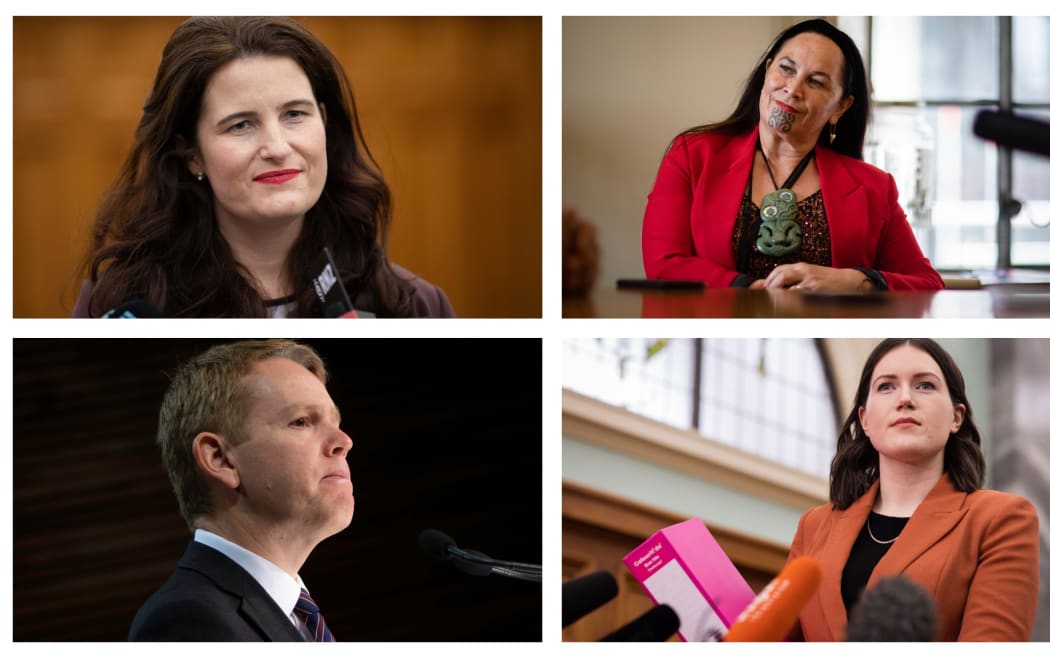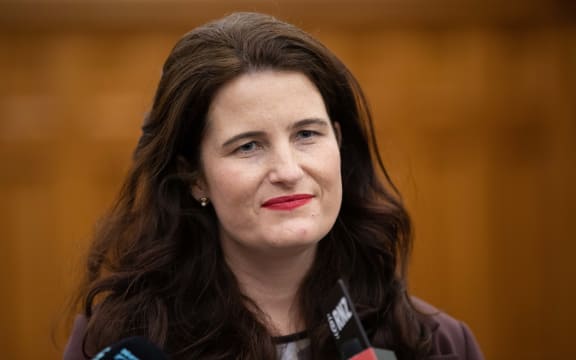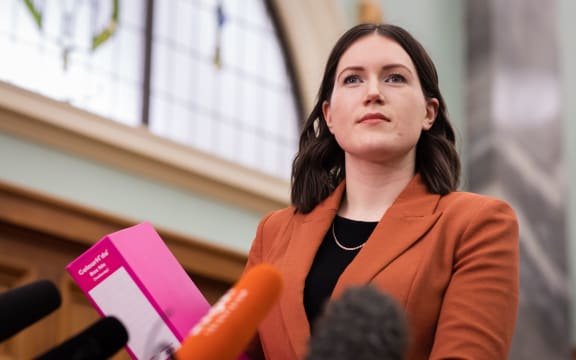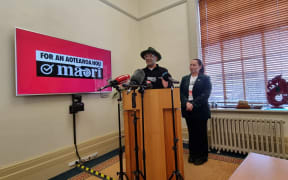
Who pays and how to fix the cost of living crisis have been at the heart of tax policy discussions this week. Clockwise from top left, National Party deputy leader Nicola Willis, Te Pāti Māori coleader Debbie Ngarewa Packer, ACT Party deputy leader Brooke van Velden and Labour leader Chris Hipkins. Photo: RNZ/ Composite
Who should pay more to tackle the cost-of-living crisis has fired up the cross-party shots as a smorgasbord of tax policies have been released, including National pre-announcing Labour's purported plans to scrap GST on fruits and vegetables, and a 'radical' tax bracket shake-up planned by Te Pāti Māori.

National deputy leader Nicola Willis Photo: RNZ / Angus Dreaver
National Party deputy leader Nicola Willis told Morning Report she stands by her release of a move she claimed would be Labour's central tax card for the coming election, and says revealing it was in the public's interest.
"I think people will be interested to know, and I'm confident on the facts of this matter."
She would not be disclosing her sources, she said.
National believes reduce GST on fruit and vegetables would be misguided as it would be unwieldy and difficult to introduce, and would benefit supermarkets and the well-off who buy more costly grocery items more than those who were struggling most.
The idea of cutting GST from fruit and vegetables rears its head every election, and is generally well supported by voters. Shoppers RNZ spoke to this week strongly supported the idea.
Labour Party leader Chris Hipkins has not denied Labour was looking at GST on fresh produce, but said he was not going to be announcing tax policy yet, and asked why Willis was focused on his party's policies instead of "making her own promises add up".

Labour leader Chris Hipkins Photo: RNZ / Angus Dreaver
Willis said this morning that Labour needs to get its own house in order and control government spending and inflation.
"In the past year alone, fruit and vegetables have gone up 22 percent ... [removing GST] would only take us back to the prices they were 9 months ago, what we really need to do is solve the underlying drivers of rampant price inflation - that's what's catching New Zealanders out, it's groceries, it's rents, it's prices across the board," Willis said.
"You've got to get at the underlying drivers of inflation, you've got to get government spending under control, you've got to stop passing costs on to farmers and food producers that end up being paid for people at the supermarket, you've got to make sure that you're taxing fairly.
"Our priority is personal income tax reduction by adjusting tax thresholds, and that's because we know if we adjust tax that way, every single dollar will end up in the bank account of the person we're targeting it at."
Asked where National's tax plan and costings were, she said it was traditional to announce them closer to the election.
"We've made clear that the difference between us and Labour is that we're prepared to look at some of the wasteful spending, inefficient spending and unproductive spending that the government is doing itself, because by reigning that in we can ensure that New Zealanders can keep more of their own money.
ACT Party deputy leader Brooke van Velden told RNZ that while removing GST from fruit and vegetables sounded attractive, it was a red herring when it came to tackling the cost of living.

ACT Party deputy leader Brooke van Velden Photo: RNZ / Angus Dreaver
"We already know from looking at the tax working group's report, they've acknowledged that this will help people who can afford things like fresh blueberries, fresh raspberries, but it's not giving a huge benefit for someone who's already counting the coins for half a cut of fresh pumpkin.
"It's much better for us to look at how we can reduce costs to families, rather than trying to put so much more compliance and administrative burden on those small grocery groups that will now have double the amount of time looking at how they figure out what's GST exempt on their store floors and you not getting actually much benefit for those that truly do need it."
Te Pāti Māori this week announced a shake up of of tax policies that would put a heavier tax burden on the wealthy and overseas interests, and which they say could raise the take-home pay of 98 percent of people and make earnings up to $30,000 tax free.
They plan to introduce a vacant house tax and land banking tax, a wealth tax, put $500m into investigating New Zealand's estimated $7b of tax evasion, and remove GST from all kai.
Te Pāti Māori co-leader Debbie Ngarewa-Packer told Morning Report this would invigorate the economy by pouring money back into it and prioritise fixing poverty, hunger and homelessness.

Te Pāti Māori co-leader Debbie Ngarewa-Packer Photo: RNZ / Angus Dreaver
"The multiplier effect of the average New Zealander being able to go out an afford to pay for better housing, for electricity, is actually going to bring more money into the economy," Ngarewa-Packer said.
"We have to look at the fact that we have 2 percent of the nation owning 50 percent of the wealth - disrupting that is not going to collapse this nation ... it's going to bring another $16.4b back into the economy.
"What we're dealing with is the noise from politicians who would prefer that the rich keep paying 9.4 percent of their wealth as tax, and the average New Zealander's paying 20.2 percent. We've got to stop pretending that there is no poverty in this country."
Addressing increasing wealth disparity would mean socio-economic problems could be tackled at the root and make a real difference to issues like homelessness and crime, she said.
"We've got politicians on the right saying we need to stop ram raiding, we need to spend billions and millions to stop this, but they don't want to put more into SFO [Serious Fraud Office] to chase up the $7b of tax evasion that we have as a nation.
"So we've got to stop the whistle-blowing the fearing and telling everyone that the country's going to go backwards... we're threatening a system that's been designed for corporates and designed for duopolies for example to thrive off.
"Those overseas investors that need ghost houses are going to be be affected - well actually, yes they are, because we have 190,000 empty homes and 90,000 homeless people. So yes it is going to upset those that have profited and done well off the way the tax system is designed."
Ngarewa-Packer said New Zealanders could accept a radical "rebalance", because the problems caused by poverty were so big.
"We have unprecedented poverty ... there is no other option if we're going to focus on having a peaceful, living with dignity, nation. We have to deal with the biggest issue we have as a nation at the moment."
Cutting GST on fruit and veges won't help most in need - tax expert
AUT senior taxation lecturer Ranjana Gupta said GST had been removed from food in Australia, but health problems it aimed to reduce remained: "Removing GST is not working".
Research had shown that demand for fruit and vegetables did not change much, regardless of costs, Gupta said. And Because higher income households spend more on food, they would have more GST cut from their spend and reap more benefit from the policy more than low income households.
Programmes in other countries showed that targeted payment cards that could only be used only for fruit and vegetables, and healthy eating education would do more to help lower income households than removing the GST.
There were also complexities in introducing and operating a targeted GST reduction, including sorting out which groceries it applied for, and that complexity meant more costs elsewhere.
"It will reduce efficiency of the tax system - increase the compliance cost for tax payers, because the resources will be diverted away from businesses used to dealing with the tax system." And more complexity could lead to opportunities for fraud, Gupta said.




